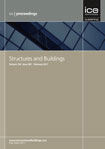
PROCEEDINGS OF THE INSTITUTION OF CIVIL ENGINEERS-STRUCTURES AND BUILDINGS
Scope & Guideline
Innovating Today for Tomorrow's Infrastructure
Introduction
Aims and Scopes
- Structural Performance and Analysis:
The journal emphasizes research on the structural performance of various materials and systems under different loading conditions, including static, dynamic, and seismic loads. - Innovative Materials and Techniques:
It explores new materials such as fiber-reinforced polymers, geopolymer concrete, and sustainable materials, along with innovative construction techniques that improve structural integrity and sustainability. - Safety and Reliability Assessments:
Research on the safety, reliability, and resilience of structures against hazards such as earthquakes, explosions, and fire is a key focus area, contributing to better design practices. - Computational Modelling and Simulation:
The journal publishes studies utilizing advanced computational methods, including finite element analysis, machine learning, and neural networks, to predict structural behavior and optimize designs. - Sustainable and Resilient Design:
There is a strong emphasis on sustainable engineering practices, including energy-efficient designs, the use of recycled materials, and the development of structures that can withstand environmental challenges. - Field Studies and Experimental Research:
The journal encourages empirical research through field studies and laboratory experiments that validate theoretical models and contribute to the practical application of engineering principles.
Trending and Emerging
- Smart Structures and Monitoring Technologies:
An increasing number of publications focus on the integration of smart technologies, such as sensors and IoT devices, for real-time monitoring of structural health and performance. - Resilience and Sustainability in Design:
There is a growing trend towards designing structures that are not only resilient to hazards but also sustainable, with an emphasis on reducing carbon footprints and utilizing eco-friendly materials. - Advanced Computational Techniques:
The use of advanced computational techniques, including machine learning and artificial intelligence for predictive modeling and optimization, is gaining traction in the journal's publications. - Multi-Hazard Assessment:
Research addressing the performance of structures under multiple hazards, including earthquakes, blasts, and fires, is increasingly prevalent, reflecting the complexity of modern engineering challenges. - Behavior of Novel Materials:
Emerging research focuses on understanding the behavior of new materials, such as high-performance concrete and fiber-reinforced composites, under various environmental and loading conditions. - Seismic Retrofit and Strengthening Techniques:
There is a noticeable increase in studies dedicated to retrofitting and strengthening existing structures, particularly in seismically active regions, to enhance their resilience.
Declining or Waning
- Traditional Materials and Construction Methods:
Research focused on conventional materials and construction practices has decreased, possibly due to the growing interest in innovative materials and sustainable design approaches. - Basic Structural Analysis:
The frequency of papers solely addressing basic structural analysis without the application of advanced computational techniques or innovative materials has diminished. - Static Load Analysis:
There is a noticeable decline in research centered around static load analysis, as more emphasis is placed on dynamic and multi-hazard assessments reflecting real-world conditions. - Non-empirical Studies:
The journal has seen a reduction in non-empirical studies that do not incorporate experimental validation, as there is a growing preference for research that is grounded in practical applications. - General Design Guidelines:
Papers that focus on general design guidelines without specific innovative contributions or case studies have become less common, indicating a shift toward more specialized research.
Similar Journals

Revista de la Construccion
Exploring Cutting-Edge Solutions in Construction EngineeringRevista de la Construcción is a pivotal academic journal dedicated to the field of civil engineering and construction, published by the prestigious Pontificia Universidad Católica de Chile, Escuela de Construcción Civil. With its ISSN 0718-915X, this journal serves as a crucial platform for disseminating innovative research, case studies, and advancements in construction methodologies that address contemporary challenges within the industry. While currently not classified as open access, it provides valuable insights benefiting researchers, professionals, and students engaged in construction development and sustainability. The journal enhances the academic discourse and contributes significantly to knowledge in engineering practices, project management, and material science. Based in Santiago, Chile, the journal aims to foster collaboration and knowledge exchange among experts both locally and globally, making it an essential resource for those striving to advance the science and practice of construction.

Journal of Structural Integrity and Maintenance
Championing Knowledge for Safer, More Efficient StructuresThe Journal of Structural Integrity and Maintenance, published by Taylor & Francis Ltd, serves as a prestigious platform dedicated to the advancement of knowledge in the fields of structural integrity, civil engineering, and materials science. With an ISSN of 2470-5314 and an E-ISSN of 2470-5322, this journal is uniquely positioned to address the critical challenges faced by researchers and professionals in building and construction, mechanical engineering, and related domains. Since its inception in 2016, this journal has been consistently recognized for its quality, currently holding a Q2 rank across several disciplines, including Building and Construction and Civil and Structural Engineering in 2023. The journal aims to publish high-quality research that contributes to the understanding and maintenance of structural integrity, fostering innovations that promote safety, efficiency, and sustainability in engineering practices. Researchers and students alike are encouraged to engage with this rich repository of knowledge, which plays a vital role in shaping future advancements in structural engineering and materials science.
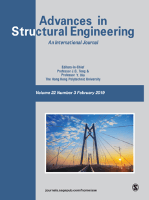
ADVANCES IN STRUCTURAL ENGINEERING
Elevating Knowledge in Civil and Structural EngineeringADVANCES IN STRUCTURAL ENGINEERING, published by SAGE PUBLICATIONS INC, is a leading journal dedicated to the advancement of knowledge in the fields of Building and Construction, as well as Civil and Structural Engineering. With a solid impact factor and a commendable Scopus ranking (Rank #60 in Building and Construction, Rank #105 in Civil and Structural Engineering), this journal stands at the forefront of academic research, providing a platform for high-quality articles that contribute significantly to the discipline. Covering a range of topics from innovative construction techniques to sustainable engineering practices, the journal aims to foster collaborative dialogue among researchers, industry professionals, and students alike. As of 2023, it boasts impressive category quartiles, ranking Q1 in Building and Construction and Q2 in Civil and Structural Engineering. ADVANCES IN STRUCTURAL ENGINEERING is a vital resource for those looking to stay abreast of emerging trends and groundbreaking developments in structural engineering, promoting an environment of continuous learning and application of best practices. With a convergence of research from 1999 to 2024, the journal not only emphasizes theoretical frameworks but also bridges the gap between academia and practical application in engineering projects.
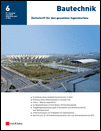
Bautechnik
Shaping the future of architecture and engineering excellence.Bautechnik is a premier academic journal in the fields of Building and Construction and Civil and Structural Engineering, published by ERNST & SOHN in Germany. With a history dating back to 1969 and a significant converged timeline through various years, this journal offers a rich repository of peer-reviewed research dedicated to advancing the principles, methodologies, and innovations within its domains. Bautechnik is currently ranked in the Q3 category for both building and construction, as well as civil and structural engineering, indicating its relevance and contribution to the academic community. Though it does not offer open access, its curated content is accessible to a global audience of researchers, professionals, and students striving for excellence in their fields. The journal aims to foster discussions and disseminate knowledge that impacts the future of construction, architecture, and engineering practices.

Periodica Polytechnica-Civil Engineering
Advancing Civil Engineering for a Sustainable FuturePeriodica Polytechnica-Civil Engineering is a prestigious journal published by the Budapest University of Technology and Economics, dedicated to advancing the field of civil engineering through high-quality research and innovative practices. Established in 1972, the journal has transitioned through various phases of publication and now spans an expansive range of topics within civil and structural engineering, geotechnical engineering, and engineering geology. With an impact factor indicating its growing influence and a commendable placement in the Q3 quartile according to the latest 2023 metrics, it recognizes contributions that bridge theoretical advancements with practical applications. While currently not open access, the journal remains a vital resource for researchers, professionals, and students seeking to stay abreast of the latest developments in engineering design, construction techniques, and geotechnical innovations. The continuous publication of significant research after almost five decades underscores its commitment to disseminating knowledge crucial for the world’s infrastructure challenges, making it an essential reference point within the engineering community.

WIND AND STRUCTURES
Pioneering Knowledge: Building Stronger Against Nature's ForcesWIND AND STRUCTURES is an esteemed peer-reviewed journal dedicated to advancing knowledge in the fields of building and construction, civil and structural engineering, and modeling and simulation. Published by TECHNO-PRESS and based in South Korea, this journal has made significant contributions to its discipline since its inception in 1998, maintaining a strong focus on innovative research up to 2024. With an ISSN of 1226-6116 and an E-ISSN of 1598-6225, it has established a notable presence in academic circles, evidenced by its Scopus rankings which position it within the mid-range percentile among its peers. The journal is classified in the Q3 quartile for 2023 in key categories including Building and Construction, Civil and Structural Engineering, and Modeling and Simulation, highlighting its relevance and importance in contemporary research. While it does not provide open access, WIND AND STRUCTURES continues to be a vital resource for researchers, professionals, and students eager to explore cutting-edge advancements and methodologies in structural resilience against environmental forces.
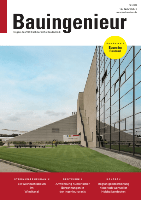
Bauingenieur
Exploring Innovations in Civil and Structural EngineeringBauingenieur, an established journal in the field of Building and Construction and Civil and Structural Engineering, has been a significant platform for scholarly discourse since its inception in 1969. Published by VDI FACHMEDIEN GMBH & CO KG UNTERNEHMEN FACHINFORMATIONEN in Germany, this journal, available in both print (ISSN: 0005-6650) and electronic formats (E-ISSN: 1436-4867), serves as a vital resource for researchers, professionals, and students dedicated to advancing knowledge and practice in engineering. Although currently without open access options, Bauingenieur aspires to contribute to the academic community by presenting cutting-edge research, case studies, and technical reviews within the realms of construction and civil engineering. As evidenced by its categorizations in the 2023 Scopus rankings, where it has a Q4 designation in both relevant categories, it provides an essential resource for understanding current trends and challenges in the industry. The journal welcomes contributions that push the boundaries of knowledge and foster innovative solutions in the built environment.

STRUCTURAL ENGINEERING AND MECHANICS
Pioneering Research in Engineering ExcellenceSTRUCTURAL ENGINEERING AND MECHANICS, a leading journal published by TECHNO-PRESS, stands at the forefront of research in the disciplines of civil, structural, and mechanical engineering. With an ISSN of 1225-4568 and an E-ISSN of 1598-6217, this South Korea-based journal has been a significant contributor to the academic community since its inception in 1994, and it continues to disseminate vital research through 2024 and beyond. Achieving a Q3 ranking in key categories such as Building and Construction, Civil and Structural Engineering, Mechanical Engineering, and Mechanics of Materials, the journal is recognized for its high standard of academic rigour and relevance in contemporary engineering challenges. Although not Open Access, it offers robust access options for institutions and professionals seeking to advance their understanding of structural systems and mechanics. Researchers, students, and practitioners in these fields will find invaluable insights and innovative studies that push the boundaries of knowledge, making this journal an essential resource for anyone invested in engineering advancements.

Magazine of Civil Engineering
Advancing Civil Engineering Knowledge for Tomorrow's InfrastructureMagazine of Civil Engineering, published by ST-PETERSBURG STATE POLYTECHNICAL UNIVERSITY, is a prominent open access journal dedicated to the field of civil and structural engineering. With an ISSN of 2712-8172 and E-ISSN 2071-0305, it serves as a vital platform for disseminating high-quality research, innovative methodologies, and current trends in building and construction. Since its inception in 2010, the journal has embraced open access, ensuring broad visibility and accessibility for its contributions to the academic community. The magazine holds a respectable position in the academic hierarchy, ranked in the Q3 quartile for both Building and Construction and Civil and Structural Engineering categories as of 2023. It is indexed in Scopus, amplifying its societal impact and reach with a rank of #114/223 in Building and Construction and #224/379 in Civil and Structural Engineering. Researchers, professionals, and students alike are encouraged to engage with the cutting-edge studies presented in the magazine, contributing to the advancement of knowledge and practice within the civil engineering domain.
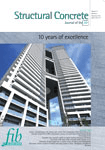
Structural Concrete
Transforming Construction Practices Through ResearchStructural Concrete, published by ERNST & SOHN, is a premier journal dedicated to the field of Civil and Structural Engineering, focusing on innovative research and advancements in concrete materials and technologies. With an impressive impact factor and a consistent ranking in the Q1 category of both Building and Construction and Civil and Structural Engineering, the journal stands as a vital resource for researchers, professionals, and students alike. It is indexed with notable Scopus ranks, underscoring its significance within the academic community. The journal spans a comprehensive scope (from 2001 to the present) that encompasses diverse topics related to the behavior, design, and application of structural concrete. Although not an open access publication, it offers valuable insights and cutting-edge knowledge that contribute to the ongoing evolution of construction practices and materials science. Structural Concrete is an essential platform for sharing pioneering findings and fostering collaboration within this dynamic field.